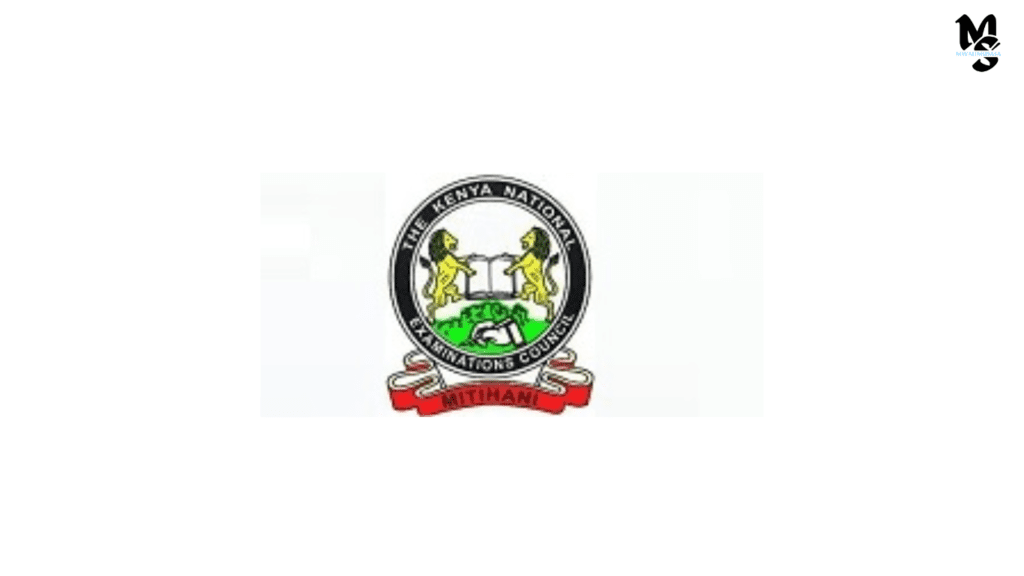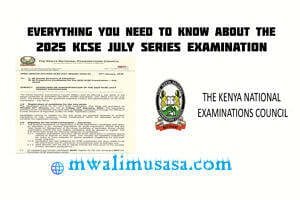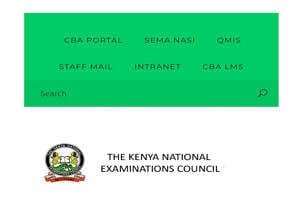Upcoming National Examinations in Kenya: Over 2.2 Million Students Set to Take KCSE and KPSEA

A logo of KNEC

Introduction
National examinations in Kenya, particularly the Kenya Certificate of Secondary Education (KCSE) and Kenya Primary School Education Assessment (KPSEA), play a pivotal role in shaping the educational landscape of the country. These examinations are critical milestones for students, as they determine not only their academic progression but also potential career pathways. With over 2.2 million students set to participate in these assessments, the significance of this period cannot be overstated.
The Kenya National Examinations Council (KNEC) is tasked with the vital responsibility of organizing and administering these national examinations. KNEC ensures that the examinations are conducted fairly, maintain high standards, and adhere to the set timelines. The meticulous planning and execution involved in these processes underscore the importance of assessments in evaluating the overall educational performance of students across the nation.
This year, the KCSE examinations are scheduled to commence on October 22, 2024, while the KPSEA will start on October 28, 2024. These dates mark a crucial period for students who have been preparing for months, if not years, for these examinations. The KCSE is a comprehensive evaluation that encompasses various subjects and is essential for students seeking to advance to tertiary education. Similarly, the KPSEA serves as a benchmark for pupils completing their primary education and transitioning to secondary school. Both assessments are key indicators of academic attainment and are closely monitored by educational authorities and institutions.
As the examination dates approach, it is imperative for students, educators, and parents to remain informed and prepared. The outcomes of the KCSE 2024 and KPSEA assessments will affect not only the students’ immediate educational opportunities but also the broader implications for Kenya’s education system as it seeks to align with current curriculum reforms, particularly the Competency-Based Curriculum (CBC). This alignment is crucial for enhancing the quality of education in the country.
The scale of the 2024 Examinations
The 2024 examination period in Kenya is poised to witness an unprecedented scale, with over 2.2 million candidates scheduled to participate. This figure predominantly comprises candidates sitting for the Kenya Certificate of Secondary Education (KCSE), while a notable number will also undertake the Kenya Primary School Education Assessment (KPSEA). The large turnout is reflective of the growing number of students advancing through the educational system, signifying the critical phase they are entering as they prepare for their future educational and professional endeavors.
The KCSE is a pivotal examination for secondary school students, as it serves as a significant determinant for admission into higher education institutions both locally and internationally. Success in the KCSE is instrumental for students seeking to pursue various courses, including degrees and vocational training. Similarly, the KPSEA marks a crucial transition for primary school students, enabling them to progress to secondary education. The results from KPSEA not only reflect students’ grasp of the primary curriculum but also inform future educational strategies.
This year’s examinations are especially significant given the implementation of the Competency-Based Curriculum (CBC), which redefines learning outcomes and assessment approaches in Kenyan education. As the country transitions to this new curriculum, the role of the KPSEA and KCSE in evaluating student competencies becomes increasingly important. The expected influx of candidates underlines the collective effort by educators, parents, and policymakers to ensure that students are adequately prepared for these crucial assessments. The government and educational stakeholders are keen to facilitate a smooth examination process, motivating students to strive for excellence amidst the challenges they may face.
New Security Measures to Curb Cheating
The Kenya National Examinations Council (KNEC) is implementing several enhanced security measures for the upcoming Kenya Certificate of Secondary Education (KCSE) and the Kenya Primary School Education Assessment (KPSEA) in 2024. These measures aim to maintain the integrity of the examination process and reduce incidents of malpractice, which have been a longstanding concern in the education system. One notable initiative is the introduction of personalized examination papers. Each paper will feature the names of the candidates, making it difficult for students to exchange or share papers, thus minimizing the chances of cheating.
Additionally, KNEC is improving surveillance within examination centers. This involves the installation of CCTV cameras and the deployment of trained security personnel to monitor activities during the examination periods. These steps are being taken to deter any potential misconduct by creating an environment where students and staff know they are being observed. KNEC has emphasized that ensuring a fair testing process is paramount, as it reflects not only on the students but also on the credibility of the national education system.
To further reinforce the seriousness of adhering to examination regulations, KNEC has outlined specific penalties for candidates and institutions found engaging in examination malpractice. Students caught cheating may face disqualification from the exam, which can severely impact their future educational opportunities. Schools may also face sanctions, including the possibility of having their examination registration revoked. In this way, KNEC aims to promote a culture of integrity and accountability, ultimately benefiting all students partaking in the KCSE 2024 and KPSEA assessments.
Use of New Containers for Secure Storage of Exam Materials
The upcoming national examinations in Kenya, including KCSE 2024 and KPSEA, will utilize a new measure aimed at enhancing the security of examination materials. The Kenya National Examinations Council (KNEC) has introduced 41 new secure containers specifically designed for the storage and transportation of these vital materials. This initiative is crucial in maintaining the integrity of the examination process, which serves over 2.2 million students, particularly in the wake of increasing concerns about exam malpractice.
These secure containers are strategically distributed across various regions, encompassing both urban and remote areas, ensuring that access to examination materials is tightly controlled. Each container is equipped with advanced locking mechanisms and tracking technologies to prevent unauthorized access. The introduction of these containers aligns with KNEC’s ongoing efforts to enhance the security protocols for national examinations, especially in the context of the Competence-Based Curriculum (CBC), which emphasizes the importance of reliable assessment practices.
The implementation of these secure storage solutions is particularly significant given the logistical challenges faced in transporting examination materials across Kenya’s diverse geographical landscape. By deploying these containers, KNEC aims to mitigate potential risks associated with the distribution process, thereby ensuring that all candidates sitting for KCSE 2024 and KPSEA can do so under conditions of fairness and safety. The secure containers not only serve to protect the integrity of the examinations but also reinforce the commitment of KNEC to uphold high standards in the educational assessment process.
In conclusion, the addition of secure containers represents a proactive approach by the Kenya National Examinations Council to fortify the examination’s logistics and security framework, ultimately aiding in delivering a seamless examination experience for all students.
Additional Technological and Logistical Measures
The 2024 Kenya Certificate of Secondary Education (KCSE) and Kenya Primary School Education Assessment (KPSEA) examinations are set to witness significant advancements in monitoring and logistics aimed at preserving the integrity of the examination process. One of the critical measures is the deployment of Closed-Circuit Television (CCTV) cameras at selected examination centers. This initiative allows for real-time monitoring, ensuring that any irregularities can be addressed swiftly. The presence of CCTV cameras serves as a deterrent against cheating and other malpractices which could undermine the credibility of these vital assessments.
In addition to the surveillance enhancements, the real-time tracking of examination materials is being prioritized through digital tools. This involves monitoring the movement of examination papers from the point of dispatch right up to the respective examination centers. The effectiveness of this system lies in its ability to provide transparency and accountability, thus reducing the chances of tampering with the examination process. With over 2.2 million students preparing to undertake examinations such as KCSE 2024 and KPSEA, ensuring the security of examination materials is paramount.
Moreover, to further fortify the examination integrity, the Kenya National Examinations Council (KNEC) has emphasized the importance of rotating supervisors regularly. This measure is designed to mitigate the risk of collusion and corruption by preventing individuals from consistently overseeing the same examination centers. By rotating supervisors, KNEC aims to establish a more neutral environment, which is crucial for maintaining public confidence in the outcomes of the KCSE and KPSEA. These additional technological and logistical measures represent a commitment to safeguarding the examination system, ultimately ensuring that the assessment process remains fair and valid for all candidates involved.
Impact of Examinations on Students’ Future
The Kenya Certificate of Secondary Education (KCSE) examinations play a pivotal role in the educational trajectory of students. With over 2.2 million candidates set to take the KCSE 2024, the outcomes of these assessments significantly influence their placement in universities, colleges, and various vocational training institutions. Achieving favorable results in KCSE is crucial as it opens doors to higher education opportunities, allowing students to pursue careers aligned with their interests and aspirations. This makes the KCSE a critical component of the Kenyan education system, one that determines the next steps for students based on their academic performance.
In addition to the KCSE, the Kenya Primary School Education Assessment (KPSEA) has emerged as a significant examination under the new Competency-Based Curriculum (CBC). The KPSEA is designed to evaluate how well students have adapted to the learning outcomes specified in the CBC framework. This assessment not only informs parents and educational stakeholders about a student’s readiness for secondary education but also guides schools in curriculum adjustments and instructional strategies. As primary school students transition to secondary education, the KPSEA results will be instrumental in shaping their educational paths and influencing their future career choices.
The examination season has far-reaching implications for students’ career prospects. The pressure to perform well in both KCSE and KPSEA can be overwhelming, but it is also a motivating factor that encourages students to focus on their studies and work diligently toward their goals. Such focus is vital in an educational landscape that is increasingly competitive, where success often hinges on examination outcomes. Overall, both KCSE 2024 and KPSEA play crucial roles in the academic and professional journeys of Kenyan students, reinforcing the significance of assessments in shaping the future workforce of the nation.
Preparation by Schools and Candidates
As Kenya approaches the national examination period in 2024, schools are intensifying their preparations for the Kenya Certificate of Secondary Education (KCSE) and the Kenya Primary School Education Assessment (KPSEA). With over 2.2 million students scheduled to sit for these examinations, it is essential for educational institutions to create an environment conducive for effective learning and revision. One of the primary strategies employed by schools is the administration of mock examinations. These assessments not only familiarize students with the examination format but also help identify areas where additional focus is needed.
The Ministry of Education is actively supporting these preparations by distributing revision materials to students. These materials, which include past papers, syllabuses, and study guides, are vital in helping students grasp the exam structure and key topics expected in the KCSE and KPSEA 2024 examinations. Both teachers and school administration are diligently working together to ensure that every student has access to these essential resources, thereby helping to level the playing field among candidates.
Teachers play a crucial role in this preparatory phase. They conduct tailored lessons that address the unique needs of pupils, integrate interactive methods into the curriculum, and encourage group study sessions that promote collaboration among peers. Such initiatives not only enhance academic readiness but also help students build confidence as they approach the examination dates.
For candidates, effective last-minute preparation is key to success. Students are advised to develop a structured study schedule that allocates adequate time for each subject while allowing for breaks to prevent burnout. Techniques such as practicing relaxation exercises and maintaining a healthy diet also play an important role in managing exam-related stress. By adopting these strategies, students can approach the KCSE and KPSEA 2024 examinations with greater assurance and clarity.
Conclusion
The upcoming national examinations, notably the Kenya Certificate of Secondary Education (KCSE) and the Kenya Primary School Education Assessment (KPSEA), are pivotal milestones for over 2.2 million students across the nation. These assessments, which are expected to take place in 2024, will not only determine the academic progression of thousands but also play a considerable role in shaping the future of the Kenyan education system. As students prepare for these examinations, the importance of integrity and vigilance cannot be overstated. Adhering to ethical practices during the examination period is essential for ensuring that results reflect genuine ability and effort.
The transition from the Competency-Based Curriculum (CBC) to exam-oriented approaches requires parents, educators, and stakeholders to rally around students, offering support and encouragement. This concerted effort is vital to combat any undue stress and anxiety that may accompany the scrutiny of examinations, such as KCSE 2024. Schools must foster an environment conducive to learning, emphasizing the value of perseverance and commitment to studies, while parents should engage positively, facilitating their children’s readiness without imposing excessive pressure.
Moreover, with the Ministry of Education’s initiatives in enhancing the transparency and credibility of the examination process, it is imperative for all involved parties to uphold this integrity by reporting any malpractices. By cultivating an atmosphere that prioritizes fair competition, the education sector in Kenya can ensure that the outcomes of these examinations truly reflect the capabilities of its students. As the nation approaches these exams, let us unite in our efforts to support, guide, and cheer on our students, paving the way for a bright educational future anchored in fairness and excellence.







